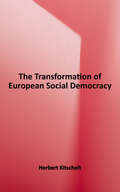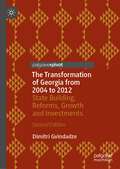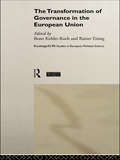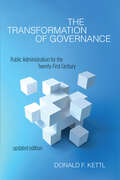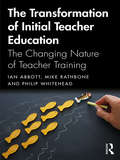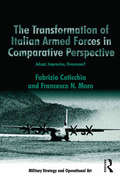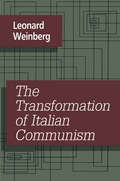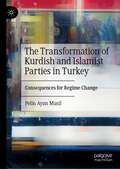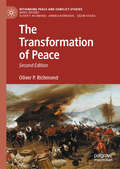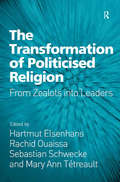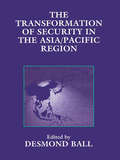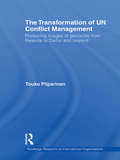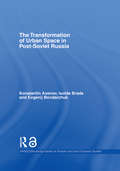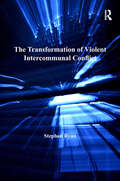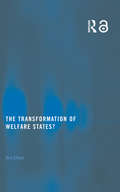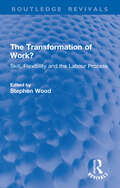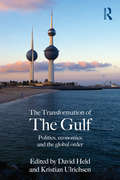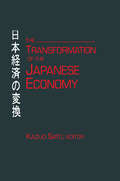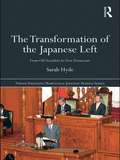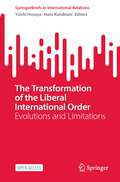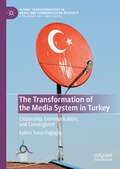- Table View
- List View
The Transformation of European Social Democracy (Cambridge Studies in Comparative Politics)
by Herbert KitscheltThis book explains the contrasting strategies of social democratic parties and their electoral fortunes in the major European democracies in the 1970s and 1980s. Going beyond approaches that focus on the influence of class structures and political-economic institutions, Herbert Kitschelt analyzes a party's competitive situation in the electoral arena, the constraints and opportunities of party organization, and ideological legacies to explain the strategic choices made by social democratic parties and their electoral results. Social democracy is far from being doomed to decline, but its success depends on its ability to transform its political message and construct new electoral coalitions.
The Transformation of Georgia from 2004 to 2012: State Building, Reforms, Growth and Investments
by Dimitri GvindadzeHow can developing countries become high-income nations? What are the reference points for measuring national development, public leadership and government performance? What is the nexus between public policies and geopolitical, political, emotional, historical, national governance-related, social and cultural norms, forces and factors which shape the process of the state building? This second edition of the book elaborates on many of these critical interconnections, focusing on 9 years after Georgia's Revolution of Roses in November 2003. The book explains what can be accomplished in two electoral terms at a given starting level of GDP per capita and which pitfalls to avoid. It contributes to documenting an almost decade-long history of Georgia.
The Transformation of Governance in Rural China
by An ChenThe outbreak of organised, violent peasant protests across the Chinese countryside from the late 1990s to early 2000s has attracted much scholarly interest. In this study, An Chen endeavours to understand from these protests the question of the Chinese government's control in the countryside and the impact of this violent resistance on China's rural governance in the context of market liberalisation. Utilising extensive field research and data collected from surveys across rural China, the book provides an in-depth exploration of how rural governance in China has been transformed following two major tax reforms: the tax-for-free reform of 2002-4, and the abolition of agricultural taxes (AAT) in 2005-6. In a multidimensional analysis which combines approaches from political science, economics, finance and sociology, Chen argues that private economic power has merged with political power in a way that has reshaped village governance in China, threatening to fundamentally change its political structure.
The Transformation of Governance in the European Union (Routledge/ECPR Studies in European Political Science #12)
by Rainer Eising Beate Kohler-KochThe book presents a theoretically informed typology of modes of governance which is tested in a careful selection of comparative country and policy studies. At the core is the question whether the European Union is destined to a network type of governance and whether and how this type of governance will be translated into the member states. The individual chapters subject the governing patterns at European and national level to empirical scrutiny. Drawing on recent research findings in different issue areas - including monetary union, social affairs, environment, genetic engineering and market liberalisation in transport, banking, energy, professional services - the contributions highlight the impact of the European activities on policy-making process in the member states.
The Transformation of Governance: Public Administration for the Twenty-First Century (Interpreting American Politics)
by Donald F. KettlAn updated edition of the classic text on public administration presents practical steps for managing government effectively in an age of hyperpartisanship.Co-winner of the Louis Brownlow Book Award from the National Academy of Public AdministrationThe traditional theory of public administration is based on entrenched notions of hierarchy and authority. However, as the structure of public work has grown less hierarchical, managers have adopted a wide variety of non-authoritarian strategies. This growing gap between theoretical ideas and actual practice poses enormous challenges for front-line leaders struggling to deal with ever-larger expectations and ever-tighter budgets—and for American government in determining how best to hold public administrators accountable for their performance.The Transformation of Governance offers a new framework for reconciling effective administration with the requirements of democratic government. Instead of thinking in terms of organizational structure and management, Donald F. Kettl suggests, administrators and theorists need to focus on governance, or the links between government and its broader environment—political, social, and administrative—through which social action occurs.In this updated edition, a new epilogue shows Kettl urging political leaders to step back from the political barricades of hyperpartisanship to consider government’s contemporary dilemma: Is there any practical way forward for public administrators to manage government effectively? Reinforcing the ten principles of bridge building which he developed in the original book, Kettl adds an eleventh, which lays out five transformative strategies: redefining public law to promote public accountability; re-conceptualizing government agencies as instruments of leverage; launching government leaders as boundary spanners; using information technology for building authority and trust; and incorporating performance management into processes that drive collaboration.With a new preface from Michael Nelson, editor of the Interpreting American Politics series, this award-winning book will be sought out by public policymakers eager to read a leading scholar's newest insights into the field.
The Transformation of Initial Teacher Education: The Changing Nature of Teacher Training
by Ian Abbott Philip Whitehead Mike RathboneTracing the development of initial teacher education since the large-scale expansion of the teaching profession after the Second World War to the present day, The Transformation of Initial Teacher Education explores the changing nature of teacher training. Examining the growth of the ‘teaching industry’, this book addresses key issues including: the return to an apprentice model the growing importance of schools in initial teacher training the continuing decline in the role played by higher education an examination of the broader socio-economic context of increased marketisiation a reconsideration of the international political factors driving the reform process; and interviews with prominent individuals who have been involved with the development of policy Considering the ideas and ideals that have permeated teacher education and how these have shaped the experiences of trainees on a variety of programmes across a broader international context, this book examines the future of teacher education and the changing nature of teaching, providing essential insight for trainee teachers, school staff and any academics involved in teacher education.
The Transformation of Italian Armed Forces in Comparative Perspective: Adapt, Improvise, Overcome? (Military Strategy and Operational Art)
by Fabrizio Coticchia Francesco N. MoroEuropean armed forces have undergone deep changes in the past two decades. Given the breadth of the debate and the size of transformations that took place, it is somewhat surprising that relatively few academic studies have directly dealt with changes in force structure of European militaries, and the Italian armed forces in particular. The focus of this book is the organizational dimension of the restructuring of armed forces through 3 different lenses: doctrine and strategic framework, budget and resource allocation, and force structure and deployment. The key issues addressed relate to how these factors interact in shaping transformation. Of particular interest is the theme of learning, which is how armed forces endogenize change in the short and long run. This study provides valuable insights into the extent to which armed forces manage to adapt to the emerging strategic and operational challenges they have to face and to illustrate the weight of institutional legacies, resource constraints and inter-organizational learning in shaping transformation. Focusing on the Italian case in comparative perspective and based on a large variety of military operations from airstrikes to peacekeeping and counterinsurgency, the book provides an innovative viewpoint on military transformation and significantly contributes to our understanding of contemporary security that is deeply shaped by the lessons learnt in Afghanistan, Lebanon, Iraq and Libya.
The Transformation of Italian Communism
by Leonard WeinbergThe end of the cold war and the fall of the Soviet empire have had major consequences for Italian politics. Leonard Weinberg explores some of those consequences, focusing on the transformation of the Italian Communist party from a Leninist to a democratic party. He also discusses the relationship between the end of communism and the unfolding of the entire Italian system.The Transformation of Italian Communism has two objectives. First, it calls the reader's attention to the role of international developments, an important but largely overlooked area involved in the study of European party politics. Traditional texts in this area emphasize domestic factors, but Weinberg focuses on the influence of international developments on domestic party politics in Italy. The implications for other nations are transparent.The second objective of this work is to examine how Italy's Communist party, the largest such party of its kind in the Western world, reacted to the fall of communism in Eastern Europe. Weinberg analyzes the meaning of these events for long-tune party members in Italy'as well as for Italian political and cultural life. The Transformation of Italian Communism offers an original, intimate, and unique assessment of how the end of the cold war has affected Italian political culture. It will be a valuable addition to those interested in the convulsions taking place in modem Italy, as well as to political scientists and theorists of political culture.
The Transformation of Japanese Employment Relations
by Jun ImaiThis book systematically evaluates the impacts of deregulatory reforms on employment relations in Japan especially focusing on the core white collar workers. Concentrating on changes in three aspects of employment relations; contracts, employee mobility and worker effort, it examines the process of social negotiation and its results.
The Transformation of Kurdish and Islamist Parties in Turkey: Consequences for Regime Change
by Pelin Ayan MusilThis book analyzes the transformation of ethnic and religious political parties in Turkey with special focus on their role in the country’s democratization and regime changes. Turkey went through a process of autocratization under the rule of the AKP government over the last two decades. Scholars question the structural, agent-centered and cultural factors that led the country on this path, and provide the lessons learnt from this case for other cases of democratic decline or breakdown. This book contributes to this debate. It treats the three national elections (2002, 2007, 2015-June) as opportunities for democratization, in which the Islamist-successor AKP (in 2002, 2007) and the Kurdish-successor HDP (in 2015-June) managed to overcome identity politics and received the organized support from social groups outside of their traditional constituency. This book argues that in a semi-democratic context where repressive acts of the state (e.g. banning of parties, arresting politicians) have been subject to widespread public criticism, confronting the state becomes a salient issue. When these parties manage to frame this issue as one of democracy, they take ownership of it, and this then becomes an opportunity for democratizing the regime. This opportunity, yet, can be missed if the party follows an office-seeking strategy rather than a policy-seeking one.
The Transformation of Maritime Professions: Old and New Jobs in European Shipping Industries, 1850–2000 (Palgrave Studies in Economic History)
by Karel Davids Joost SchokkenbroekThis book deals with the economic impact of technological changes and the rise of passenger shipping on social relations on board and ashore in European shipping industries between c.1850 and 2000. The changes in motive power, communication techniques and positioning technologies and the rise of passenger shipping went together with the creation of new tasks and functions and the marginalization or disappearance of traditional jobs and skills. This book presents case-studies on changes in different maritime professions between the middle of the nineteenth century and the end of the twentieth century, covering the shipping industries of a variety of seafaring countries in Europe. The subjects include changes in maritime labour at large, changes in specific groups of deck, catering or engine room personnel, such as captains, cooks, catering personnel, engineers, or radio-operators. A number of chapters employ a prosopographical or micro-historical approach, while others apply a spatial perspective, analyze business records, materials from professional associations or distil information from large sets of quantitative data. This book will be of interest to academics and students of economic history, maritime and labour history.
The Transformation of Peace (Rethinking Peace and Conflict Studies)
by Oliver P. RichmondThe second edition of this influential book examines the transformation of the discourse and praxis of peace, from its early beginnings in the literature on war and power to the development of intellectual and theoretical discourses of peace, contrasting this with the development of practical approaches to peace and examining the intellectual and policy evolution regarding peace. Now with reflections on each chapter and a new introduction and conclusion, the book is essential reading for researchers and students of peace and conflict studies and beyond.
The Transformation of Politicised Religion: From Zealots into Leaders
by Rachid Ouaissa Hartmut Elsenhans Mary Ann TétreaultIncluding contributions from leading scholars from Algeria, France, Germany, India and the United States this book traces the rise and turn to moderation of the New Cultural Identitarian Political Movements, often labelled in the West as fundamentalists. Arguing that culturally based ideologies are often the instruments, rather than the motivating force though which segments of a rising middle strata challenge entrenched elites the expert contributors trace the rise of these movements to changes in their respective countries’ political economy and class structures. This approach explains why, as a result of an ongoing contestation and recreation of bourgeois values, the more powerful of these movements then tend towards moderation. As Western countries realise the need to engage with the more moderate wings of fundamentalist political groups their rationale and aims become of increasing importance and so academics, decision-makers and business people interested in South Asia and the Muslim world will find this an invaluable account.
The Transformation of Security in the Asia/Pacific Region
by Desmond BallThe security architecture of the Asia/Pacific region is in a profound transformation. Such changes are not without problems, which are discussed here.
The Transformation of UN Conflict Management: Producing images of genocide from Rwanda to Darfur and beyond (Routledge Research on International Organisations)
by Touko PiiparinenThe world has vowed "Never again" in memory of the 800,000 Rwandans and other groups slaughtered by génocidaires. Yet, ever since the Holocaust, the international community has repeatedly betrayed its pledge, most notably in 1994 with regard to the Rwandan Tutsi, and again ten years later in Darfur. This book examines how the UN failed to prevent or halt the Rwandan genocide: the most efficient mass killing in history. It offers a new explanation, focussing on the structure of the UN and four mechanisms which were pertinent to UN conflict management at that time: early warning; bureaucratic rationalisation; organisational learning; and Western normalisation. The author sees the Rwandan case as a ‘child of its time’, or a focal point in which the dysfunctions of the ailing conflict management mechanisms of the 1990s combined with devastating consequences. The book proceeds to examine the transformation of these mechanisms from Rwanda to Darfur - a development which is regarded as indicative of a wider tendency – or direction – in UN conflict management over the past ten years and in the foreseeable future. This book will be of great interest to students and scholars of political science, international relations, ethnic politics, international organizations and conflict studies.
The Transformation of Urban Space in Post-Soviet Russia (BASEES/Routledge Series on Russian and East European Studies #Vol. 30)
by Isolde Brade Konstantin Axenov Evgenij BondarchukIn the years since 1989, the societies of Russia and Eastern Europe have undergone a remarkable transformation from socialism to democracy and free market capitalism. Making an important contribution to the theoretical literature of urbanism and post-communist transition, this significant book considers the change in the spatial structure of post-Soviet urban spaces since the period of transition began. It argues that the era of transformation can be considered as largely complete, and that this has given way to a new stage of development as part of the global urban and economic system: post-transformation. The authors examine the modern trends in the urban development of western and post-socialist countries, and explore the theories of the transformation and post-transformation of urban space. Providing a wealth of detailed qualitative research on the Russian city of St. Petersburg, the study examines the changing structure of its retail trade and services sector. Overall, this book is an important step forward in the study of the spatial dynamics of urban transformation in the former communist world.
The Transformation of Violent Intercommunal Conflict
by Stephen RyanIn recent years there has been a remarkable growth of interest in the concept of conflict transformation and the closely related strategy of grass-roots peace building. Yet there exists no general critical analysis of the concept of conflict transformation in the context of violent inter-communal conflict and the different approaches that can be included in response to this category of dispute. This study offers a comprehensive survey and critical overview of this emerging area. Examining the reasons for the growing interest in the concept of conflict transformation in situations of ethnic conflict, the book explores the different dimensions of transformation. It draws on examples of strategies from a number of situations of 'ethnic conflict', including Northern Ireland, Israel/Palestine, Bosnia, Kosovo, Cyprus, Spain, Sri Lanka and the former Soviet Union , to identify and assess key issues and problems that have emerged, and ultimately to propose a stronger emphasis on the promotion of inter-subjective understanding.
The Transformation of Welfare States?
by Nick EllisonThis accessible work provides a ‘political sociology’ of welfare states in industrial societies, with both historical and contemporary perspectives. Ellison focuses on the social and political underpinnings of a number of welfare regimes and looks at the transformations they have undergone and the challenges they face. This book assesses current debates about the role of ‘globalization’ in welfare state change, paying particular attention to contemporary views about the capacity of embedded institutional structures to limit the effects of global economic pressures. Ellison assesses the changing nature of social policies in nine OECD countries – selected to include ‘liberal, ‘social democratic’ and ‘continental’ welfare regimes. Taking labour market and pension policies as the main areas of investigation, this volume provides ‘snapshots’ of welfare reform in each case, charting the ways in which different regimes ‘manage’ the range of challenges with which they are confronted. Ultimately, the book suggests that all contemporary welfare regimes are experiencing a level of ‘neoliberal drift’. As yet, this trend towards liberalization remains constrained in those countries with more ‘coordinated’ economies and institutionalized forms of social partnership – but the question is for how long? This book will be of great interest to students and scholars of International Politics, Sociology and Social Policy.
The Transformation of Work in Welfare State Organizations: New Public Management and the Institutional Diffusion of Ideas
by Ronald Staples Frank Sowa Stefan ZapfelHow has New Public Management influenced social policy reform in different developed welfare states? New managerialism is conceptualized as a paradigm, which not only shapes the decision-making process in bureaucratic organizations but also affects the practice of individuals (citizens). Public administrations have been expected to transform from traditional bureaucratic organizations into modern managerial service providers by adopting a business model that requires the efficient and effective use of resources. The introduction of managerial practices, controlling and accounting systems, management by objectives, computerization, service orientation, increased outsourcing, competitive structures and decentralized responsibility are typical of efforts to increase efficiency. These developments have been accompanied by the abolition of civil service systems and fewer secure jobs in public administrations. This book provides a sociological understanding of how public administrations deal with this transformation, how people’s role as public servants is affected, and what kind of strategies emerge either to meet these new organizational requirements or to circumvent them. It shows how hybrid arrangements of public services are created between the public and the private sphere that lead to conflicts of interest between private strategies and public tasks as well as to increasingly homogeneous social welfare provision across Europe.
The Transformation of Work?: Skill, Flexibility and the Labour Process (Routledge Revivals)
by Stephen WoodOriginally published in 1989, and now reissued with a new preface by the editor, this interdisciplinary study brings together an internationally distinguished group of scholars to shed light about work organization and the effects of new management methods and technologies. The book gives an incisive account of changes in work organization and relations during the latter part of the 20th Century. Accessible and comprehensive, it will be of interest to those in the sociology of work, industrial relations, organization theory, economics, geography and management
The Transformation of the Gulf: Politics, Economics and the Global Order
by David Held Kristian UlrichsenThis book examines the political, economic and social transformation of the six member-states of the Gulf Cooperation Council (GCC) and the ways in which these states are both shaping, and being reshaped by, the processes of globalisation. Adopting a multidisciplinary approach, the volume combines thematic chapters focusing on issues such as globalisation, nationalism and identity, political thinking, and economic diversification and redistributive policymaking with empirical chapters studying specific aspects of reform and change: the emergence of governing markets the rise of Sovereign Wealth Funds Islamic Finance the relationship between energy and sustainability trends in foreign aid donorship, strategic and foreign policy formulation. Contributions from experts in the field provide cutting-edge snapshots of a region in flux and collectively offer a roadmap of its repositioning in the global order, examining the interaction between global processes and internal dynamics of change and resistance that inject new dimensions into debates over the loci of local and global transformations and the manner in which each plays off the other. Situating the Gulf States firmly within their global twenty-first century context, this book will hold particular appeal to theorists of globalisation as well as to scholars of comparative politics, international political economy and area studies.
The Transformation of the Japanese Economy (East Gate Reader Ser.)
by Kazuo SatoDuring the rapid growth period of the Japanese economy, from the mid-1950s to the mid-1970s, the economic system that became entrenched in Japan -- the so-called Japanese-style capitalism -- was based on the government-business-bureaucracy triad. Although its distinct features survived the subsequent two decades of slow growth, there are many indications that the Japanese economy is once again struggling to transform itself. These translations from the Japanese economic literature expertly address this transformation.
The Transformation of the Japanese Left: From Old Socialists to New Democrats (Nissan Institute/Routledge Japanese Studies)
by Sarah HydeThis book examines the transition within the Japanese party system that has seen the demise of ‘the old socialists’, the Japan Socialist Party, and in its place, the emergence of the Democratic Party of Japan as the leading opposition party. Sarah Hyde has produced an original book which looks at the intra-left (non-communist) opposition party manoeuvrings during the 1990s through to the new millennium in a highly detailed and focused manner whilst simultaneously looking at the three most significant changes for the left nationally: the change to the electoral system, the change to public opinion regarding defense and the Constitution after the First Gulf War and the changes to the Labour Union movement. Ending with a chapter on the incredibly important 2007 Upper House election, which brings the development of the opposition full circle, this book will be a valuable source for students and scholars of Japanese politics, electoral systems and opposition politics.
The Transformation of the Liberal International Order: Evolutions and Limitations (SpringerBriefs in International Relations)
by Hans Kundnani Yuichi HosoyaThis open access book aims to emphasize the potential for Japan, Europe and Indo-Pacific countries including the US to respond to shared domestic and international challenges on finding joint ways to uphold and develop the liberal international order (LIO) in the Asian Pacific region and the world. It explores how these countries and the region (the EU) can work together to promote solidarity and cooperation to advance democratic standards and rules-based norms globally.The US understands the LIO in a political sense and centers its focus on democracy, aiming to build a coalition of democracies opposed to China and Russia which represent a kind of authoritarian axis. The US aims both to defend the LIO and respond to the China challenge and to build a coalition of countries that will do both. In contrast European countries aim at defending the “rules-based order”—a term preferred because they fear that the concept of the LIO might alienate or antagonize non-democratic countries. They face a dilemma between working with China to reform the LIO or, in seeking to defend it from China, excluding China. Germany and France differ regarding whether to play a passive or active role in the Indo-Pacific, the former choosing to preserve peace and stability for continued exports, and, until recently, doing little to contribute to security. Its views echo those of the ASEAN countries, which are unable or unwilling to take an active role in protecting the LIO. On the contrary France, along with the UK, actively carries out presence operations in the Indo-Pacific. Rather than upholding US dominance, France supports a multipolar order that will also reduce China’s influence in the region, with France acting as a balancing power and offering an alternative to the choice between China and the United States. Japan and India show interest in European views with the former leaning more toward its allies, the US and AUKUS, and the latter seeing Europe less as an alternative to the status quo and more as a complement of QUAD. This book concludes that the US needs to build coalitions rather than forcing allies and neighbors to choose sides, while Japan, Asian countries, and Europeans should more actively reform the LIO.
The Transformation of the Media System in Turkey: Citizenship, Communication, and Convergence (Global Transformations in Media and Communication Research - A Palgrave and IAMCR Series)
by Eylem YanardağoğluThe book focuses on the changes that the media system in Turkey went through since early 2000s. Its perspective considers sociology of citizenship and focuses on processes such as Europeanization, de-Europeanization, authoritarianism on the one hand and implications of digitalization and convergence on the other. It tracks the transformation of the media system through the trajectories of normative, participative, and entrepreneurial citizenship practices. The final sections focus on aspects of convergence evidenced in bottom-up and participatory forms of digital media such as the birth of citizen journalism and fact-checkers after the demise of conventional mainstream media in recent years.
